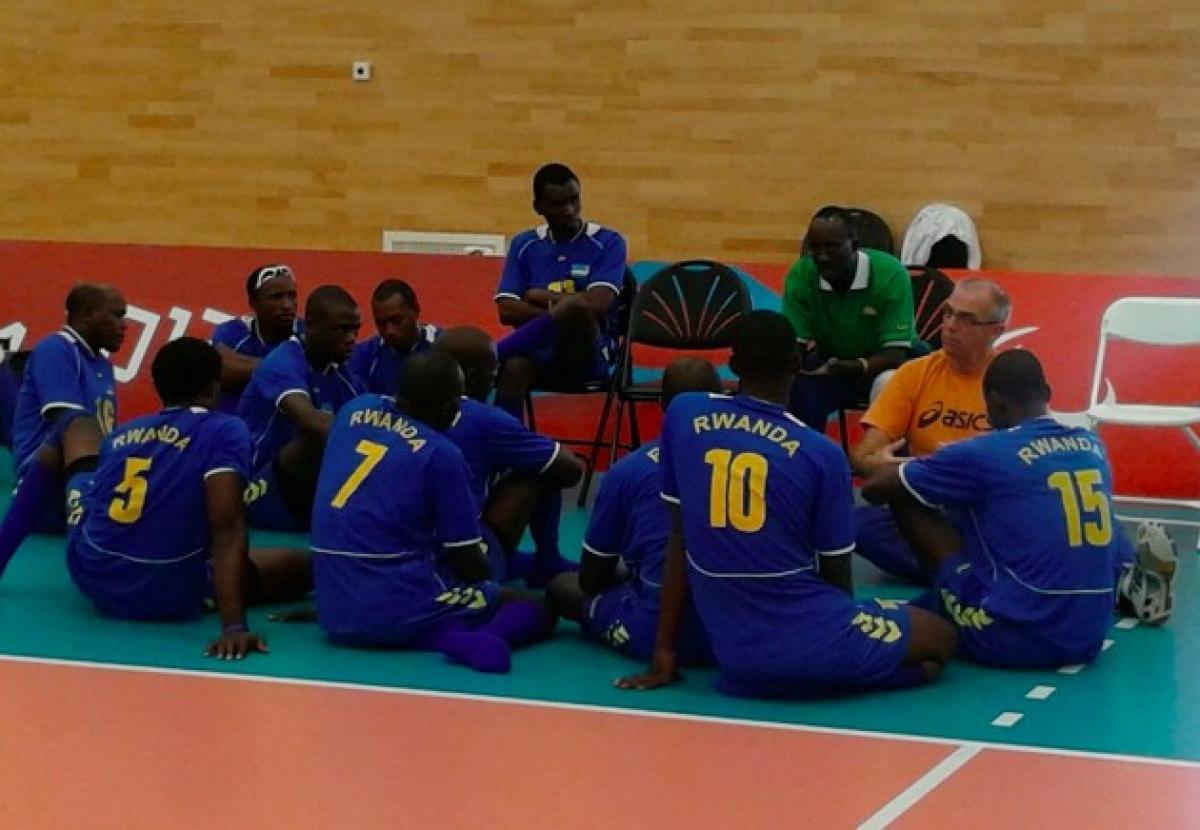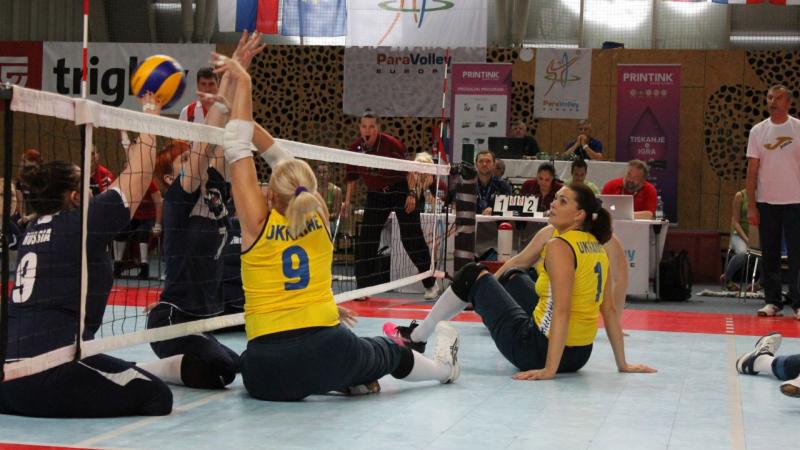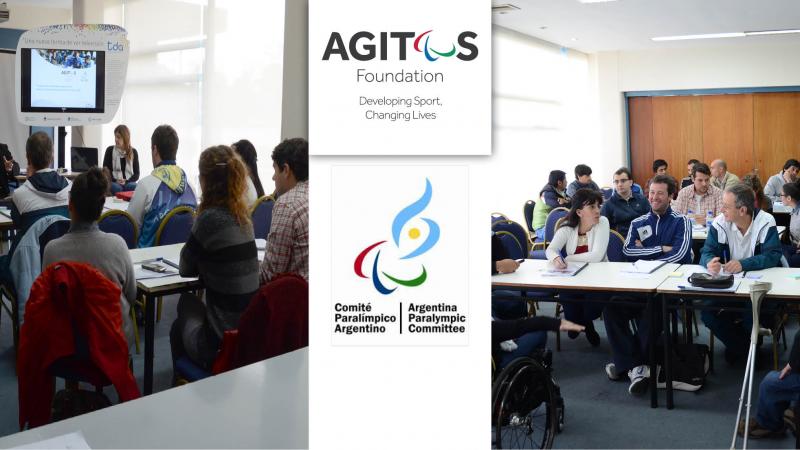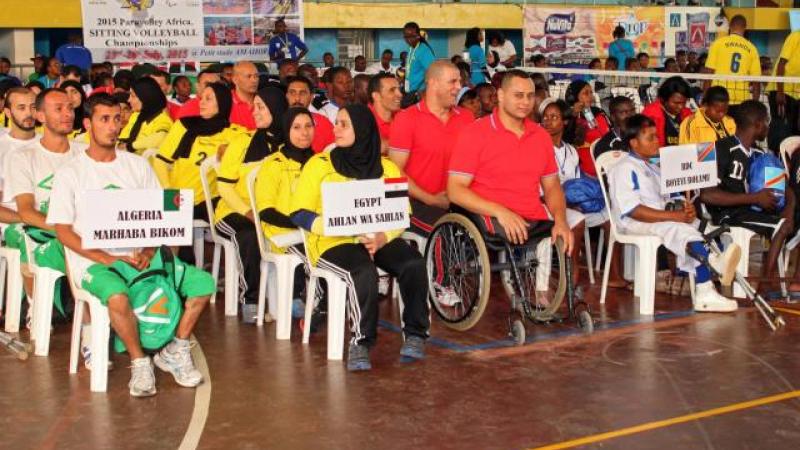Big read: The man behind Rwanda’s sitting volleyball success
The Dutch coach has revolutionised the sport in Rwanda, helping both the men’s and the women’s teams qualify for their first Paralympic Games in history. 13 Dec 2015
Dutch coach Peter Karreman speaking to Rwandan sitting volleyball team.
“It was unbelievable and it was a great honour for Rwanda to take that ninth place in the Paralympics.”
The Netherlands’ Peter Karreman was working as an instructor for World ParaVolley (WPV) in 2010 when he received a life-changing phone call from his colleague Jouke de Haan, the same man who had introduced him to sitting volleyball six years before.
“’Peter, Rwanda needs a coach for its national sitting volleyball team. Are you in?’” De Haan said.
Karreman responded: “I am.”
Since then, the Dutch coach has followed a path of success with Rwanda’s sitting volleyball teams. This has already led him to two Paralympic Games, and the future looks even brighter, with Rio 2016 ahead.
Karreman had been the Netherlands’ sitting volleyball coach between 2007 and 2009, taking part in two European Championships: Hungary 2007 and Poland 2009. His first encounter with sitting volleyball in Africa was in 2010, when he organised a women’s sitting volleyball tournament in Nairobi, Kenya, as a tutor for WPV. Simultaneously, he conducted a training course there with fellow Dutch coach Joze Banfi.
That was when de Haan asked Karreman to become the head coach of the Rwandan men’s sitting volleyball team.
“I was impressed by Peter Karreman, a multi-tasking, ambitious, enthusiastic and persistent professional,” de Haan said. “He was eager to start a challenge and cooperate with the aims and objectives of the NPC [National Paralympic Committee] of Rwanda. He has proved to be the right choice.”
De Haan had trained top international teams such as the Netherlands, Germany and Egypt. In 2008, he was preparing the Egyptian team for the Beijing 2008 Paralympic Games when his colleague Jaap Akkerhuis, who had been running training courses across Africa, came to his door with an offer to start developing the sport in Rwanda.
After the 2008 Paralympics, de Haan began working in Rwanda, where he had to re-introduce sitting volleyball after four years. The Gorillas Team from Kigali had first brought the sport to Rwanda in 2004. However, a similar sport called sit-ball gained popularity to the detriment of sitting volleyball, which had its rebirth in 2008 thanks to the efforts of de Haan and of Pierre Van Meenen, then-President of the WPV.
"The World Organisation Volleyball for Disabled (WOVD), now World Para Volley, took the opportunity to combine the start of the new game with some courses in refereeing and classification,” explained de Haan. “Following a simple training plan with 24 players, we managed to build a national team. At the end of the first training sessions we were ready to organise a tournament in Kigali.”
The turning point
In 2009, just one year after arriving in Rwanda, de Haan planned to lead the brand new national team to its first World Championships, after achieving qualification at the Great Lakes Championships. However, due to his busy schedule with the German National Team, de Haan knew he had to look for a replacement, and Karreman became the new head coach.
Karreman’s first mission was to set the team up for the 2010 World Championships, which would be held in Oklahoma, USA. Rwanda participated, expecting to grow and learn, aware of the high international level. The 3-0 victory over India was very much celebrated in Rwanda. In addition, the team took one set from Croatia, Morocco and Libya. The small victories were enough to boost Rwanda’s confidence.
“The team kept training and playing better each game,” Karreman said. “During the week in Oklahoma we also practised with the Russian national team, which is one of the best in the world. That was very impressive for the Rwandan team. And they not only improved their level of playing. There was also the African spirit they showed to the world. They really did a great job,” Karreman said.
This first international experience marked a turning point.
“From Peter we learned how to prepare international matches and gained experience from him as a coach,” said Dominique Bizimana, a member of the men’s sitting volleyball team.
With high motivation and self-confidence, the Rwandan men’s team faced the African Sub-Saharan Sitting Volleyball Championships in 2011, which served as a qualifier for the London 2012 Paralympic Games. Rwanda proved to be the best and claimed gold after subsequently defeating Uganda, the Democratic Republic of Congo and Burundi in the group stage. Rwanda then beat Burundi again in the semi-finals and Kenya in the final, in straight sets.
For the first time, an African country from the Sub-Saharan zone qualified for the Paralympics. Moreover, Rwanda became the second representative from the continent after Egypt, who had competed at the two previous editions, Athens 2004 and Beijing 2008, claiming bronze at the former Games.
London 2012 was yet another step forward for sitting volleyball in Rwanda.
The Paralympic debut went very well and the team reached its goal of “not ending last,” Karreman said.
It was the first time to play in front of such a big crowd, who chanted “Rwanda, Rwanda.”
“It was beyond our happiness when Rwanda won its first match against Morocco,” the current President of NPC Rwanda, Celestin Nzeyimana, said.
“It was unbelievable and it was a great honour for Rwanda to take that ninth place in the Paralympics.”
The experience from London also helped to heal the wounds inflicted upon the Rwandan society after the genocide in 1994, and to overcome the differences that had once existed between two ethnic groups, the Hutu and the Tutsi.
“Sport played a key role in integrating injured people into society,” Nzeyimana said. “Most of them thought they were done after losing their legs or an arm. But sport showed how strong it is in proving the contrary. Members from the opposite sides during the war started playing together in the same team. They were fighting before but sport united them afterwards. Sport has the power of changing people.”
Apart from being the darlings of the London 2012 public, Rwanda’s newcomers enjoyed much media attention from all over the world while being in London.
“We were quite afraid of competing against the strong teams, but in the end we were surprised because we could not believe that we could perform at that level,” Bizimana said. “The media were very interested in our team. I had around three interviews every day.”
Rwanda’s success was also recognised back home in Africa.
“As always, sports unite and connects people,” Karreman said. “The response of the public in Rwanda was, therefore, very positive.”
As a result, more people with physical impairments joined clubs, which now exist throughout the Sub-Saharan country. The boost of sitting volleyball also led to more people participating in para-sports, such as athletics, powerlifting and goalball.
The women’s turn
Even though the training conditions and funding situation have not improved as much as needed after London 2012, NPC Rwanda’s plan was to start focusing on creating a women’s team to reach another qualification for Rio 2016.
“We were watching women perform without the representation of any African country and we were not pleased by this situation,” Nzeyimana said. “With Karreman and Denis Le Breuilly, World Para Volley Sport Director, we fixed the goal of bringing an African women’s team to the Games for the first time.”
Karreman organised several one-week training programmes to get women with physical impairments involved with the game. Finally, he managed to have 12 players on the national team.
The coach worked out a four-year training plan, and a programme called “Towards Rio 2016 Women Sitting Volleyball Team” was implemented. The initiative of NPC Rwanda was supported by the Laureas Sport for Good Foundation. After the women’s team sealed the East African Championship title in August 2014, the Sports Ministry agreed to fund a training camp.
In 2015, the Rwandan women’s team won the African Championship and therefore qualified for Rio 2016. But the men’s team did not make it this time since only one men’s qualification slot was available at the regional Championships, compared to two from London.
“The men’s team performed well during the African Championship winning the silver medal, but Egypt is still far ahead being top five in the world,” Karreman said.
The final match was intense.
Liliane Mukobwankabo, captain of the women's team, was big in helping Rwanda come back from a 2-1 set deficit to defeat Egypt. The win secured a qualification slot for Rwanda at Rio 2016, the first time an African women's sitting volleyball team has qualified for a Paralympic Games.
“We, athletes, are feeling good and even though we have been playing sitting volleyball only for three years now, we do not want to go to Rio just to visit the city, but to win and enjoy the Games,” Mukobwankabo said.
Rio 2016 and beyond
The women’s team have focused on preparing for Rio 2016. The training programme includes weekly workouts as well as some tournaments outside Africa.
Rwanda’s ambitions for Rio are set high and the relatively new team will have to work hard to achieve them.
“Our goal for Rio is to win a match against Canada or Iran at least,” Karreman said.
“The men’s team already have a leading role in African sitting volleyball next to Egypt and they will manage to get better. The women will hopefully be able to hold their current leading position,” Karreman explained.
As in many other African countries, funding is also an issue in Rwanda.
“You need money to train more and specially to participate in strong tournaments like the Paralympics,” Karreman said. The results from the past four years, however, suggest that the Dutch coach will find a solution to make things work in Rwanda.
“Karreman is a good person, who understands the African context, who believes in making difficult things possible and is eager to reach the goals he sets. He is a patient, supportive person, ready to give without expecting to get something in return,” Nzeyimana said.
The Dutch coach’s success goes way beyond the court, and shows how important sport is as a vehicle for integration and as a tool for the improvement of social relations. “We are one team, we are all coming from different parts of the country, but we are all Rwandan, that is what counts,” Mukobwankabo said.

 Facebook
Facebook
 Instagram
Instagram
 Twitter
Twitter
 Youtube
Youtube
 TikTok
TikTok
 Newsletter Subscribe
Newsletter Subscribe







